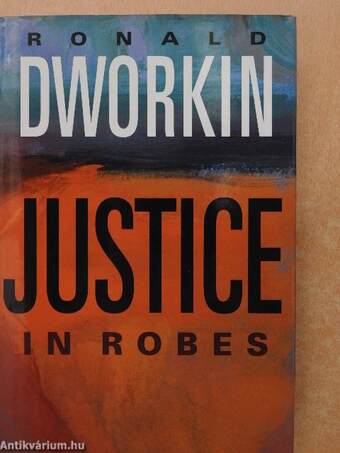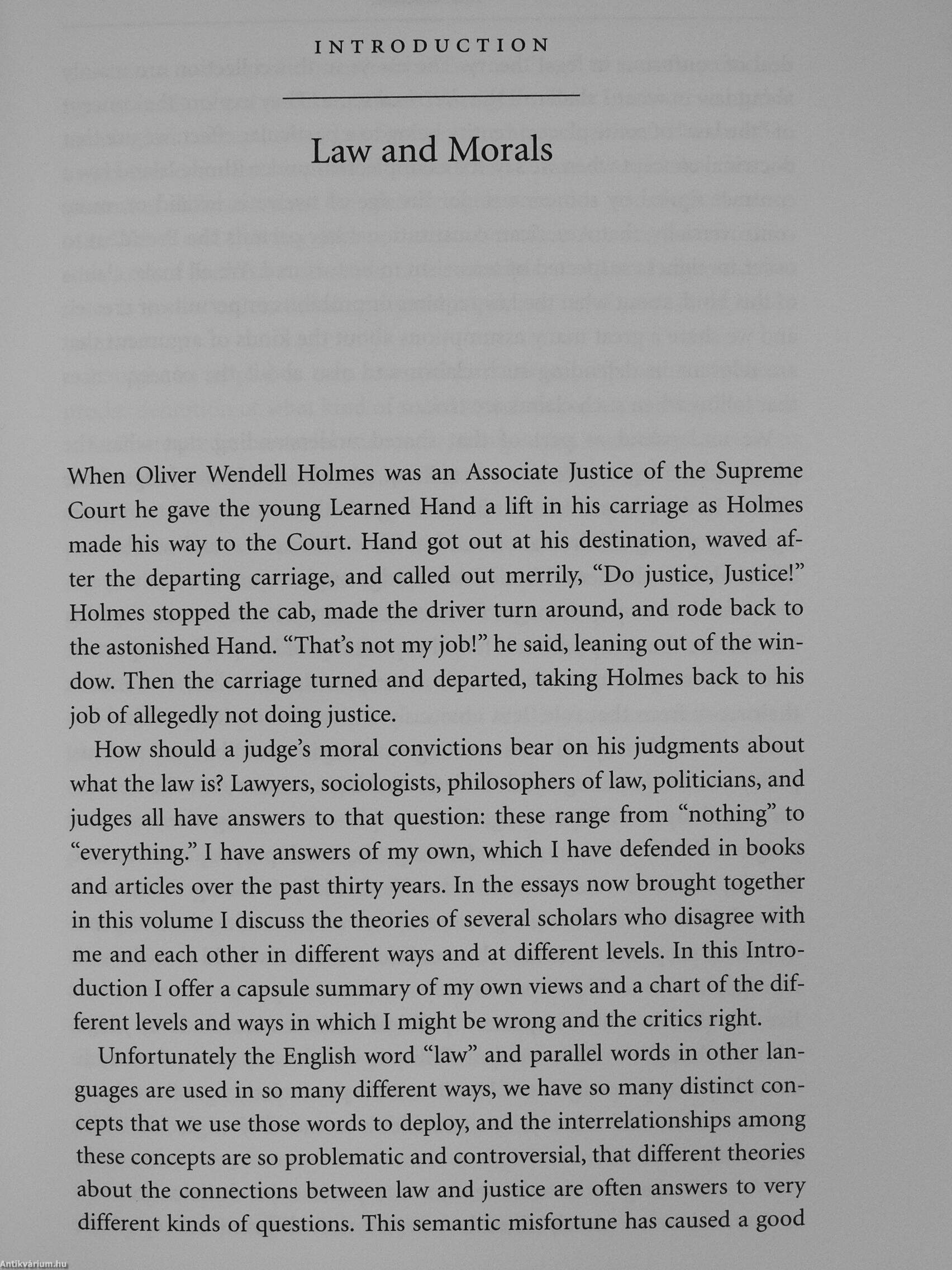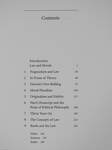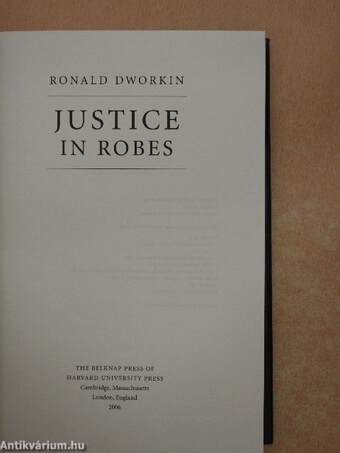1.125.992
kiadvánnyal nyújtjuk Magyarország legnagyobb antikvár könyv-kínálatát
Justice in Robes
| Kiadó: | The Belknap Press of Harvard University Press |
|---|---|
| Kiadás helye: | Cambridge |
| Kiadás éve: | |
| Kötés típusa: | Fűzött kemény papírkötés |
| Oldalszám: | 308 oldal |
| Sorozatcím: | |
| Kötetszám: | |
| Nyelv: | Angol |
| Méret: | 24 cm x 16 cm |
| ISBN: | 0-674-02167-3 |
naponta értesítjük a beérkező friss
kiadványokról
naponta értesítjük a beérkező friss
kiadványokról
Előszó
TovábbFülszöveg
FROM THE BOOK:
"It is important to decide whether moral criteria are ever, and if so when, among the truth conditions of propositions of law: the conditions that must hold to make such a proposition true."
"Any adequate account of the aspirational concept—of the values of legality and the rule of law— must give a prominent place to the ideal of political integrity, that is, to the principle that a state should try so far as possible to govern through a coherent set of political principles whose benefit it extends to all citizens. Recognizing and striving for that dimension of equality is, I think, essential to the legitimization of state coercive power."
"Nothing is easier than composing definitions of liberty, equality, democracy, community, and justice that conflict with one another. But not much, in philosophy, is harder than showing why these are the definitions that we should accept."
"Our great experiment as a nation, our country's most fundamental contribution to... Tovább
Fülszöveg
FROM THE BOOK:
"It is important to decide whether moral criteria are ever, and if so when, among the truth conditions of propositions of law: the conditions that must hold to make such a proposition true."
"Any adequate account of the aspirational concept—of the values of legality and the rule of law— must give a prominent place to the ideal of political integrity, that is, to the principle that a state should try so far as possible to govern through a coherent set of political principles whose benefit it extends to all citizens. Recognizing and striving for that dimension of equality is, I think, essential to the legitimization of state coercive power."
"Nothing is easier than composing definitions of liberty, equality, democracy, community, and justice that conflict with one another. But not much, in philosophy, is harder than showing why these are the definitions that we should accept."
"Our great experiment as a nation, our country's most fundamental contribution to political morality, is a great idea triangulated by the following propositions. First, democracy is not simple majority rule, but a partnership in self-government. Second, that partnership is structured and made possible by a moral constitution guaranteeing to individuals one by one the prerequisites of full membership. Third, we are committed by our history to an institutional strategy of asking judges—men and women trained in the law—to enforce those guarantees of equal citizenship."
HOW SHOULD A JUDGE'S MORAL CONVICTIONS bear on his judgments about what the law is? Lawyers, sociologists, philosophers, politicians, and judges all have answers to that question: these range from "nothing" to "everything." In his new book Ronald Dworkin argues that the question is much more complex than it has often been taken to be and charts a variety of dimensions—semantic, jurisprudential, and doctrinal—in which law and morals are undoubtedly interwoven. He restates and summarizes his own widely discussed account of these connections, which emphasizes the sovereign importance of moral principle in legal and constitutional interpretation, and then reviews and criticizes the most influential rival theories to his own. He argues that pragmatism is empty as a theory of law, that value pluralism misunderstands the nature of moral concepts, that constitutional originalism reflects an impoverished view of the role of a constitution in a democratic society, and that contemporary legal positivism is based on a mistaken semantic theory and an erroneous account of the nature of authority. In the course of that critical study he discusses the work of many of the most influential lawyers and philosophers of the era, including Isaiah Berlin, Richard Posner, Cass Sunstein, Antonin Scalia, and Joseph Raz. Dworkin's new collection of essays and original chapters is a model of lucid, logical, and impassioned reasoning that will advance the crucially important debate about the roles of justice in law. Vissza
Témakörök
- Filozófia > A szerző származása szerint > Amerikai
- Filozófia > Témaköre szerint > Etika
- Idegennyelv > Idegennyelvű könyvek > Angol > Filozófia > Nemzetisége szerint > Amerikai
- Idegennyelv > Idegennyelvű könyvek > Angol > Filozófia > Témaköre szerint > Etika
- Jogtudomány > Igazságszolgáltatás
- Filozófia > Témaköre szerint > Tanulmányok, esszék
- Filozófia > Témaköre szerint > Szakfilozófiák
- Idegennyelv > Idegennyelvű könyvek > Angol > Filozófia > Témaköre szerint > Tanulmányok, esszék
- Idegennyelv > Idegennyelvű könyvek > Angol > Filozófia > Témaköre szerint > Szakfilozófiák
- Idegennyelv > Idegennyelvű könyvek > Angol > Jogtudomány > Egyéb
Ronald Dworkin
Ronald Dworkin műveinek az Antikvarium.hu-n kapható vagy előjegyezhető listáját itt tekintheti meg: Ronald Dworkin könyvek, művekMegvásárolható példányok
Nincs megvásárolható példány
A könyv összes megrendelhető példánya elfogyott. Ha kívánja, előjegyezheti a könyvet, és amint a könyv egy újabb példánya elérhető lesz, értesítjük.








